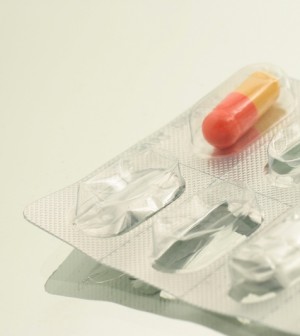- 10 Strategies to Overcome Insomnia
- Could Artificial Sweeteners Be Aging the Brain Faster?
- Techniques for Soothing Your Nervous System
- Does the Water in Your House Smell Funny? Here’s Why
- Can a Daily Dose of Apple Cider Vinegar Actually Aid Weight Loss?
- 6 Health Beverages That Can Actually Spike Your Blood Sugar
- Treatment Options for Social Anxiety Disorder
- Understanding the Connection Between Anxiety and Depression
- How Daily Prunes Can Influence Cholesterol and Inflammation
- When to Take B12 for Better Absorption and Energy
ADHD Medications Linked to Sleep Problems in Kids

The stimulant medications used to treat attention-deficit/hyperactivity disorder (ADHD) can keep some kids awake at night, a new research review confirms.
The analysis, published online Nov. 23 in Pediatrics, found that children given stimulant medications for ADHD sometimes developed problems falling asleep and staying asleep.
The medications — which include drugs like Ritalin, Concerta and Adderall — already list sleep problems as a potential side effect.
But studies on the question have actually had conflicting findings, said Katherine Kidwell, a researcher at the University of Nebraska-Lincoln who led the new analysis.
Plus, it’s common for kids with ADHD to have sleep problems, whether they’re on medication or not. And some researchers have argued that medication may actually improve sleep, by easing ADHD symptoms in general, Kidwell said.
To get a clearer picture on the overall evidence, her team pooled the results of seven clinical trials in which children with ADHD were randomly assigned to take a stimulant or not.
It turned out that kids given stimulants tended to have more sleep problems, on average. In one study, for instance, children on methylphenidate (the generic form of Ritalin) got about 20 minutes less sleep each night, on average, than children given placebo pills.
“We’re not trying to encourage parents to stop their children’s medication,” Kidwell said. “But we do encourage parents to talk to their pediatrician if they think their child is having sleep problems.”
Their doctor may be able to switch the medication, or adjust the dose or timing of the doses, according to Kidwell.
Her team found that, on average, the more often a child took a stimulant during the day, the longer it took to fall asleep at night. So one way to address that could be to switch to an extended-release formula of the medication, taken once early in the day, the researchers point out.
But parents and kids may also need advice on setting up good sleep habits, Kidwell said.
Dr. Trevor Resnick, chief of pediatric neurology at Nicklaus Children’s Hospital in Miami, agreed.
“Make sure kids have a bedtime routine,” said Resnick, who was not involved in the research. “Have them go to bed at the same time every night, and keep electronic devices out of the bedroom.”
It’s “extremely important,” Resnick added, that all children regularly get a good night’s sleep, for the sake of healthy brain development.
He did stress, however, that only a minority of children will develop sleep problems related to ADHD medications. It’s a possibility that’s been recognized, Resnick said, so the new findings are not surprising.
Kidwell pointed out that any medication can have any number of side effects — and parents have to weigh the overall “costs and benefits” of ADHD drugs.
“This study just provides additional information on one of the potential costs,” she said.
More information
The U.S. Centers for Disease Control and Prevention has more on ADHD treatment.
Source: HealthDay
Copyright © 2026 HealthDay. All rights reserved.










